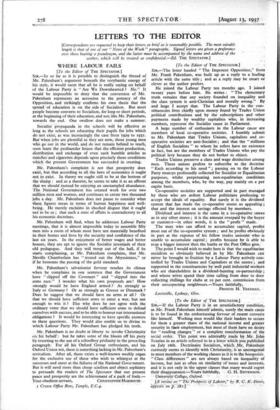LETTERS TO THE EDITOR
[Correspondents are requested to keep their letters. as brief as is reasonably possible. The most suitable length is that of one of our " News of the Week" paragraphs. Signed letters are given a preference over those bearing a pseudonym, and the latter must be accompanied by the name and address of the author, which will be treated as confidential.—Ed. THE SPECTATOR.]
WHERE LABOUR FAILS
[To the Editor of THE SPECTATOR.] SIR,—In so far as it is possible to distinguish the thread of. Mr. Pakenham's argument beneath the corybantic energy of his style, it would seem that all he is really saying on behalf of the Labour Party is " Are We Downhearted ? No." It would be impossible to deny that the conversion of Mr. Pakenham represents an accession to the potency of the Opposition, and strikingly confirms his own thesis that the spread- of education is on the side of Socialism. But most people become converts to Socialism, for long or short periods, at the beginning of their education, and not, like Mr. Pakenham, towards the end. One swallow does not make a summer.
Socialist propaganda in the schools will be effective so long as the schools are educating their pupils for jobs which dci not exist, as was increasingly the case from 1929 to 1931. But when jobs are plentiful as they are now, those young men who go out in the world, and do not remain behind to teach; soon learn the profounder lesson that .the efficient production, distribution and exchange of even such humble articles as matches and cigarettes depends upon precisely those conditions which the present Government has succeeded in creating.
Mr. Pakenham's complaint is not that prosperity does exist, but that according to all the laws of economics it ought not to exist. In theory we ought still to be at the bottom of the slump : and as a theorist, he seems to take it as an affront that we should instead be enjoying an unexampled abundance. The National Government has created work for over two million men and women, and continues to create' two thousand jobs a day. Mr. Pakenham does not pause to consider what these figures mean in terms of human happiness and well- being. He merely exclaims in shocked disgust that it ought not to be so ; that such a state of affairs is contradictory to all his economic doctrines.
Mr. Pakenham will find, when he addresses Labour Party meetings, that it is almost impossible today to assemble fifty men into a room of whom most have not materially benefited in their homes and lives by the security and confidence of the last six years. In the enjoyment of better wages and better houses, they are apt to ignore the Socialist jeremiads of their old pedagogue. And they will troop out of the hall, if he starts complaining, as Mr. Pakenham complains, that Mr. Neville Chamberlain has " ironed out the Abyssinians," or if he bemoans the passing of the gold standard.
Mr. Pakenham's salvationist fervour reaches its climax when he complains in one sentence that the Government have " slipped off the Covenant " and " slipped into the arms race." I wonder what his own proposals are ! How strongly would he have England armed ?- As strongly as Italy or Germany ? Or as strongly as Greece or Denmark ? Does he suggest that we should have no arms at all ? Or that we should have sufficient arms to enter a war, but not enough to win it ? Else why does he not agree with the ordinary voter that we should have sufficient arms to defend ourselves with success, and to be able to honour our international obligations ? It would be interesting to have specific answers to these questions. They would also enable us to divine to which Labour Party Mr. Pakenham has pledged his troth.
Mr. Pakenham is no doubt at liberty to invoke Christianity on his behalf : but he takes some of the bloom off his piety by resorting to the use of a schoolboy piofanity in the preceding paragraph. For all his Oxford Group enthusiasm, and his Oxford Union wit, there is something lacking in Mr. Pakenham's revivalism. After all, there exists a well-known weekly organ for the exclusive use of those who wish to whimper at the successes and sneer at the failures of the National Government. But it will need more than cheap sciolism and abject sophistry to persuade the readers of The Spectator that our present peace and prosperity are the achievement of a pack of fools.—






































 Previous page
Previous page